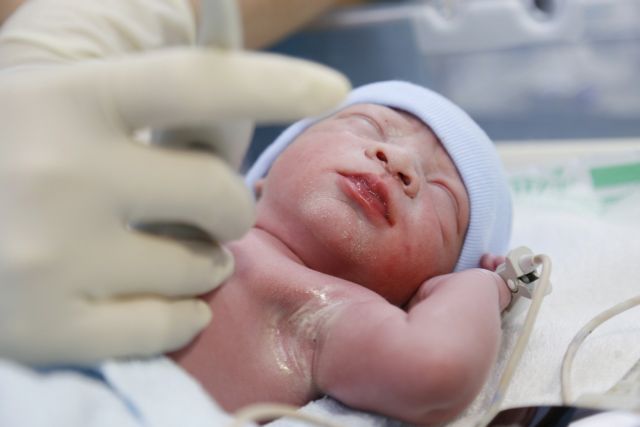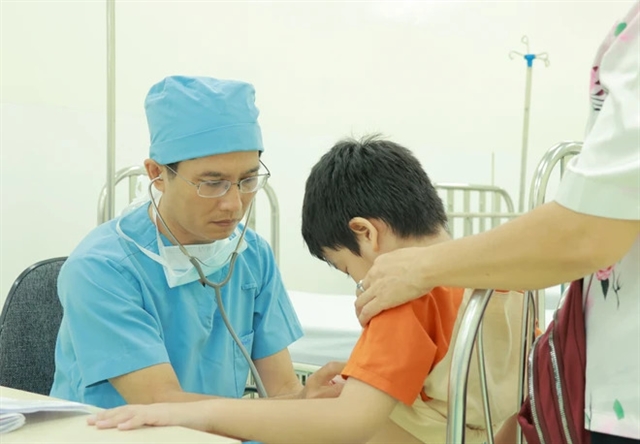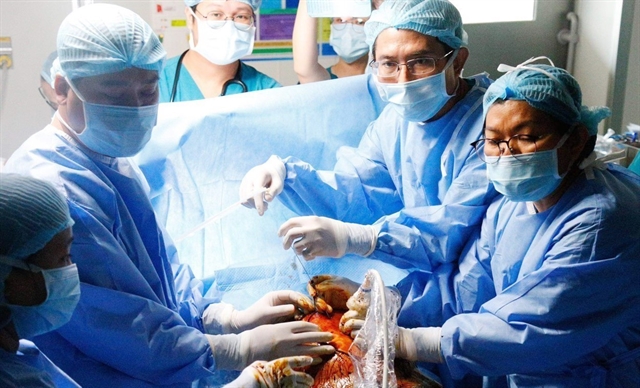 Society
Society

 |
| Doctor Đỗ Nguyên Tín examines a child with congenital heart disease. — VNA/VNS Photos |
HCM CITY — Renowned for his 'golden hands', cardiac surgeon Đỗ Nguyên Tín has fixed the hearts of many young children, bringing their rhythm back to normal.
Over 27 years, he has performed thousands of heart surgeries for children with congenital heart disease, Vietnamplus.vn reported.
Recently, as deputy head of the cardiac department at Children’s Hospital 1 in HCM City, Dr Tín has earned the moniker "heart surgeon for foetuses."
Foetal cardiac surgery, a challenging technique developed globally in the past five years, captivated Tín after witnessing Brazilian doctors performing it in the United States many years ago.
He recalls being awestruck, realising the potential to save lives.
"I was almost holding my breath because even a slight deviation could endanger the life of the foetus," Tín said.
"However, under the skilled hands of the surgeons, the procedure was carried out swiftly. I felt awakened and determined to master this technique."
Driven by this revelation, Tín embarked on a journey to master the technique, travelling to countries where it was performed.
He said: "Performing interventions for foetal heart defects involves repairing the heart from its stem cells. The hearts of children are thus repaired and healed from within the foetus, meaning many babies with congenital heart defects will be born healthy, eliminating the uncertainty of waiting for surgery after birth."
However, not every beginning was smooth.
Two years ago, a pregnant woman nearing 30 weeks gestation discovered that her unborn baby had a severe congenital defect. Despite the risks involved, her family fervently desired foetal surgery and accepted the uncertainties it entailed.
Doctor Tín and his team attempted the procedure but failed.
He said: "At that time, failure occurred due to many reasons, partly due to lack of equipment, inexperienced skills and inadequate knowledge. This made me restless for a long time, realising my shortcomings, and the need for continuous learning and improvement."
After hundreds of experiments on animals, Tín and his colleagues achieved a breakthrough on January 4 and 12, successfully performing the first two foetal heart surgeries in Việt Nam at Từ Dũ Hospital.
It was done to unclog the heart valve through the mother’s womb.
This achievement, considered miraculous given the limited global mastery of the technique, signifies a new era for foetal cardiac care in Southeast Asia.
After the surgery, the baby was born healthy, although the pulmonary artery was still slightly narrow.
However, Tín considers this a success, emphasising the importance of this technique in preventing foetal mortality and reducing the need for complex surgeries later in life.
 |
| Tín and his colleagues perform a foetal heart surgery at Từ Dũ Hospital in HCM City. |
This ground-breaking success serves as a catalyst for advancing foetal cardiac surgery techniques in the healthcare industry.
Despite the pressure of the first attempt, Tín and his team celebrated the milestone, recognising the potential to transform the lives of children with congenital heart disease.
He said: "We were happy, embracing and celebrating right in the operating room after many sleepless nights of worry and pressure. If we had failed, the price to pay would have been huge, but if successful, it would open up new opportunities for children with congenital heart disease. Fortunately, we made it."
With over 27 years of experience under his belt, he had delicately performed nearly 17,000 surgeries for children grappling with congenital heart disease.
But behind his success lies a poignant narrative of heartache and determination.
Tín recalls the harrowing days of his early career, where he stood witness to the heart-breaking loss of infants to congenital heart defects, their lives cut short by surgeries that came too late.
In the southern region, even major heart hospitals performed only a few surgeries annually, leaving a staggering toll of mortality among children with congenital heart issues.
He often had to sign death certificates for nearly 200 patients on some days, leaving him deeply unsettled. This drove him to dedicate himself to paediatric cardiac intervention despite the immense challenges.
Driven by a thirst for knowledge, Tín embarked on a quest for expertise, going to medical institutions like Chợ Rẫy Hospital, the Heart Institute, and the HCM City University of Medicine and Pharmacy Hospital.
His relentless pursuit paid off as the number of children receiving life-saving interventions for congenital heart defects steadily climbed, from just a few to several dozen, with several hundred surgeries performed annually.
Children's Hospital 1 alone orchestrated over 800 cardiac interventions in 2023, a testament to Tín's unwavering commitment to expanding access to quality healthcare.
Tín and his colleagues travelled to remote areas to screen children for congenital heart defects, bringing them back to Children's Hospital 1 for surgery, offering a glimmer of hope to families in the farthest reaches.
Despite performing over 17,000 surgeries, Tín finds cheer in each triumphant intervention, cherishing the joy that accompanies every mended heart.
"Every successful case brings me joy. If I perform five surgeries in a day, I have five reasons to be happy. Our happiness multiplies each day," he said.
But amid the victories lie lessons learned from failures. Tín holds fast to the belief that setbacks are stepping stones to progress, urging himself and his peers to glean experience from every misstep.
Though the completion of the first two foetal cardiac surgeries marks a significant milestone, he views it not as an endpoint, but as the genesis of a long and arduous journey.
"Our mission is to lay the groundwork, to pave the way for others to follow," he said.
"The road ahead is long and will undoubtedly come with its costs. Success is only truly achieved when it is widespread, when many doctors and units can perform it, and when many children can receive interventions from within the womb.
"Restoring a child's heartbeat to its natural rhythm is the greatest joy in my profession."
It is this steadfast belief that propels him ever forward, setting his sights on new horizons, where innovative techniques hold the promise of saving for children hindered by "rhythm errors" in their hearts. — VNS